What are the advantages of silicon nitride ceramic sealing rings
In the industrial field, mechanical seals are known as the “heart” of equipment, and the sealing ring is the most critical “valve” in this heart. Its performance is directly related to the operational efficiency, lifespan, and reliability of the equipment. Among numerous materials, silicon nitride (Si ∝ N ₄) ceramics have emerged as a rising star and have become one of the preferred materials for high-performance sealing rings. This article will provide a detailed analysis of the seven core advantages of silicon nitride ceramic sealing rings and explain how they can solve difficult problems in practical applications.
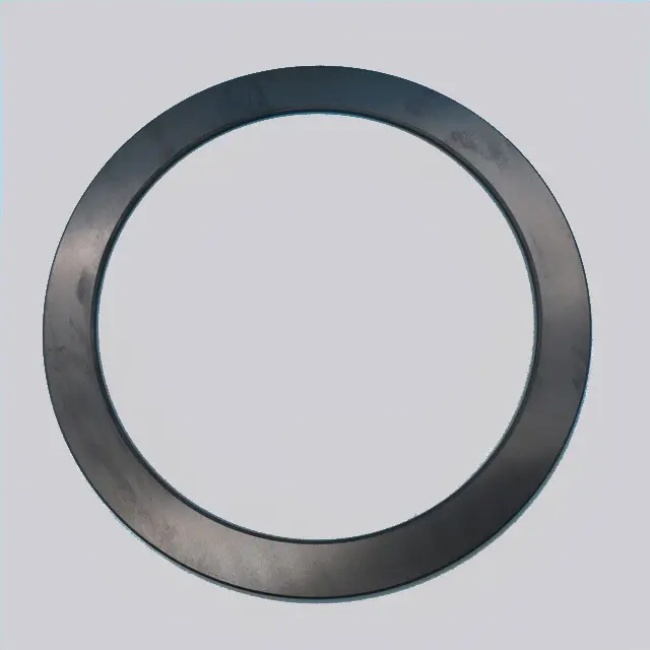
Extremely wear-resistant, solving the problems of short equipment life and frequent downtime
Advantage Explanation: Silicon nitride ceramics have extremely high hardness, second only to diamond and cubic boron nitride, with a Vickers hardness of over Hv1.600-1800. This means that it is extremely wear-resistant and has minimal wear when compared to other materials such as carbon graphite, hard alloys, etc.
Problem solved:
Extended sealing life: In media containing small solid particles (such as slurry, sewage, dust environment), ordinary material sealing rings will quickly wear out and fail. Silicon nitride ceramic rings can effectively resist abrasive wear and extend the sealing life by several times or even tens of times.
Reduce maintenance costs: A longer lifespan means fewer replacement frequencies, significantly reducing equipment downtime and maintenance costs.
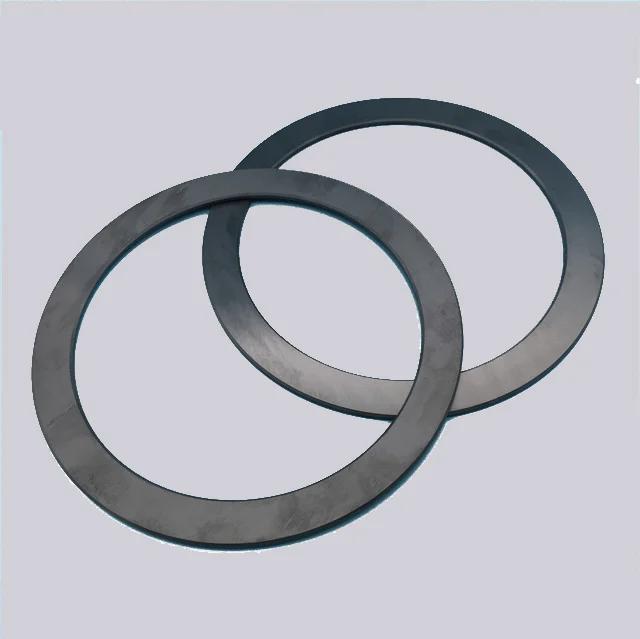
Excellent self-lubricating properties and low friction solve the problems of high power consumption and bite failure
Advantage Explanation: When paired with many materials, silicon nitride has a very low coefficient of friction (especially in the presence of a small amount of water). It also has self-lubricating properties, which can maintain low and stable friction even in extreme situations of poor lubrication or dry friction.
Problem solved:
Reduce operating energy consumption: Low friction means less power is required to drive the seal, which helps improve overall efficiency and save energy.
Prevent sudden failure: When the equipment suddenly loses oil or experiences insufficient lubrication during cold start, the metal sealing ring is highly susceptible to tearing and scrapping due to high temperature biting. Silicon nitride ceramic rings can better cope with this working condition and avoid catastrophic failure.
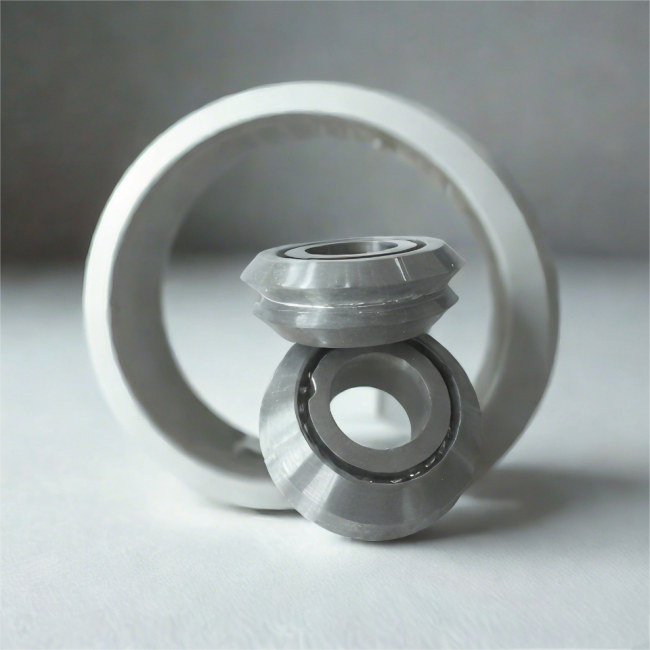
Outstanding corrosion resistance, solving the problem of corrosion in strong acid and alkali environments
Advantage Explanation: Silicon nitride is a covalent compound with stable structure. It can withstand almost all inorganic acids, various bases, salt solutions, organic solvents, and molten metals such as aluminum, zinc, and copper, except for hydrofluoric acid and strong bases.
Problem solved:
Alternative to expensive metals: In highly corrosive media such as chemical, pharmaceutical, and electroplating, expensive metals such as Hastelloy and titanium alloys are originally required for sealing. Silicon nitride ceramic rings provide a solution with better performance and lower cost.
Ensure sealing integrity: Corrosion can damage the smoothness and flatness of the sealing surface, leading to leakage. The corrosion resistance of silicon nitride ensures that the sealing surface remains intact for a long time and the leakage rate is stable.
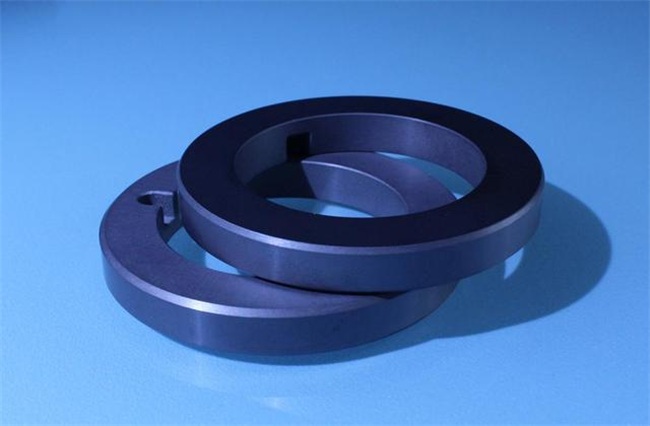
High mechanical strength and toughness, solving problems of brittle fracture and impact failure
Advantage Explanation: This is the core advantage that distinguishes silicon nitride from other ceramics such as alumina. It not only has high hardness, but also has high bending strength and fracture toughness. Its toughness is 3-5 times that of ordinary alumina ceramics, and it can withstand certain mechanical and thermal impacts.
Problem solved:
Anti accidental impact: Vibration and pressure fluctuations are inevitable during installation, commissioning, or operation, and traditional ceramic rings are fragile. The high toughness of silicon nitride rings makes them more resistant to unexpected mechanical impacts, reducing the rate of damage during installation and use.
Adapt to complex working conditions: It can be applied to situations with large pressure fluctuations or slight collision risks, with a wider range of applications.
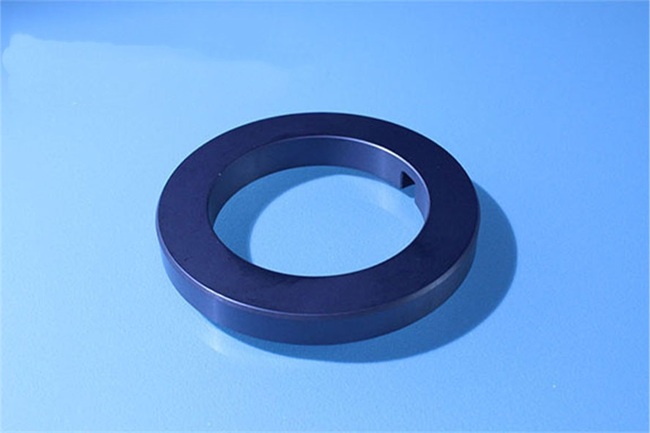
Excellent thermal performance, solving sealing problems under high temperature and thermal shock conditions
Advantages detailed explanation:
High temperature resistance: Silicon nitride can maintain its strength and hardness at temperatures above 1200 ° C without significant performance degradation.
Low thermal expansion coefficient: Its thermal expansion coefficient is very small, which means that the size change of the part is minimal when the temperature changes.
High thermal conductivity: It has good thermal conductivity, which is conducive to the rapid dissipation of frictional heat and avoids local overheating of the sealing end face.
Problem solved:
Dealing with high temperature environments: widely used in high-temperature applications such as automotive turbochargers, high-temperature pumps, and molten metal transfer pumps.
Thermal shock resistance: The combination of low thermal expansion and high thermal conductivity enables it to withstand rapid temperature changes (thermal shock) without cracking. For example, during cold start or sudden injection of cooling medium, the sealing surface will not rupture due to sudden cooling and heating.

Lightweight, solving vibration and stability problems under high-speed rotation
Advantage Explanation: The density of silicon nitride is very low (about 3.2-3.3 g/cm ³), only 40% of that of steel, and even lighter than titanium alloy.
Problem solved:
Improving stability: In high-speed rotating equipment such as high-speed centrifuges and turbomachinery, lighter sealing rings generate less centrifugal force, which helps reduce vibration, improve operational stability and dynamic balance accuracy.
Reduce auxiliary system load: Reducing weight can lower the load requirements on auxiliary sealing components such as springs and bellows, making the entire sealing system design more compact.

Good insulation performance, solving electrochemical corrosion problems
Advantage Explanation: Silicon nitride is an excellent electrical insulator with high electrical resistivity.
Problem solved:
Avoid electrocorrosion: When sealing is used to transport pure water or other conductive media, different metal materials can easily form galvanic cells, resulting in electrochemical corrosion (electrocorrosion). Using silicon nitride as an insulating material as a sealing ring can completely isolate current and avoid electrical corrosion problems.

Silicon nitride ceramic sealing rings, with their seven comprehensive advantages of wear resistance, lubrication, corrosion resistance, toughness, heat resistance, lightweight, and insulation, perfectly solve the core pain points encountered by traditional sealing materials in extreme working conditions, such as short lifespan, easy corrosion, easy fracture, high energy consumption, and poor stability.
Its typical application areas include:
Automotive industry: Turbocharger rotor shaft seal
Chemical and Pharmaceutical: Mechanical Seals for Pumps Transporting Strongly Corrosive Media and Slurry
Energy and environmental protection: sealing in flue gas desulfurization, sewage treatment and other devices
Metallurgical industry: Sealing of continuous casting machines and molten metal pumps
High end equipment: Sealing of key parts such as high-speed CNC machine tool spindles and aircraft engines
Choosing a silicon nitride ceramic sealing ring is not only about selecting a component, but also a strong guarantee for the stable, long-lasting, and reliable operation of the equipment in harsh environments.
Brudeze Ceramics supplies and sells a wide range of high-quality quartz glass, including alumina ceramics, zirconia ceramics, silicon nitride ceramics, aluminum nitride ceramics, silicon carbide ceramics, boron carbide ceramics, bioceramics, machinable ceramics, etc. We can meet the customization requirements of various ceramic products.
CATEGORIES
LATEST NEWS
- Zirconia Ceramic Rod Custom...
- High-temperature resistance...
- What is the wear resistance...
- What is the hardness of cer...
- Aluminum oxide ceramic cust...
- What are the main aspects o...
- What are the mechanical pro...
- Thermal properties of zirco...
- What properties should be c...
- What are the mechanical pro...
